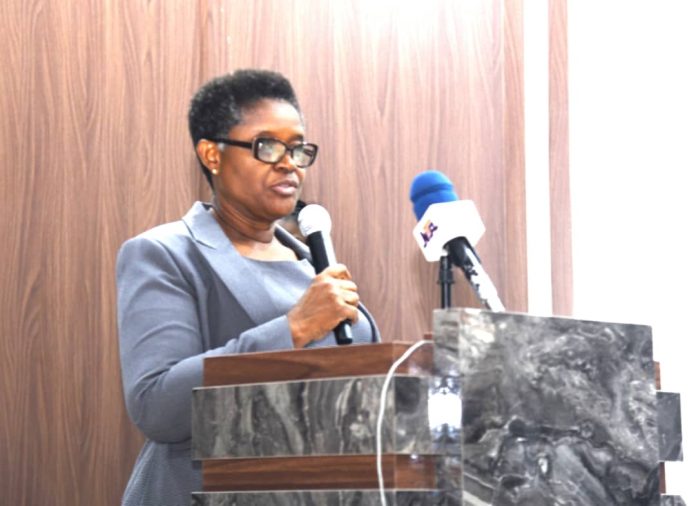
The Honourable Attorney General of the Federation and Minister of Justice (HAGF), Lateef Fagbemi, SAN, has emphasized the need for a strategic and coordinated approach to the fight against cybercrimes in Nigeria. He stated that combating cybercrime is not the responsibility of a single institution but a national movement requiring collective commitment.
The HAGF made this remark in his keynote address delivered by the Director, Solicitors Department, Mrs. Gladys Odegbaro, who represented him at the ongoing 2nd National Consultations on the Cybercrime and Cybersecurity Legal Framework in Nigeria, themed “Towards a Coordinated and Informed National Response to Cybercrime”, held in Abuja.
According to Fagbemi, “The digital domain has become the new battlefield of economic survival, public trust, and national security. Nigeria must not stand as a passive observer in this war without borders. We must be strategic, coordinated, and relentless. Yesterday’s Cybercrime Awareness Walk was a vivid demonstration of that conviction a march of unity between law enforcement and citizens, between policy and people. It sent a clear message that the fight against cybercrime is not the duty of a single institution; it is a national movement.”
Fagbemi further noted that “Cybercrime is now a trillion-dollar threat to the global economy. INTERPOL’s 2023 Africa Cybercrime Assessment ranked Nigeria among the top ten countries targeted by business email compromise, online fraud, and sextortion. Nearly 60 percent of Nigerian victims are under 30 years old. Behind every statistic is a story a student defrauded, a business crippled, a child exploited online. These crimes erode public confidence, deter investment, and weaken the digital foundations upon which our future prosperity depends. For a nation positioning itself as Africa’s digital hub, this is not merely a criminal justice issue it is an existential development challenge.”
Highlighting the Federal Government’s deliberate and strategic response, the Minister maintained that “The Cybercrimes Prohibition, Prevention, Act 2015 was our first major step. A decade later, its review is not a luxury but a necessity. Through these National Consultations, we are shaping twin bills one focused on Cybercrime as a criminal justice instrument, and another on Cybersecurity governance and critical infrastructure protection. Together, they will establish a robust, modern legal architecture that reflects global best practices, aligns with the Budapest Convention and the United Nations Convention on Cybercrime (2024), and ensures that Nigeria’s digital sovereignty is protected under the rule of law.”
Speaking on institutional coordination, Fagbemi identified the Joint Case Team on Cybercrimes (JCTC) as a major achievement a multi-agency engine for investigation and prosecution that brings together the Ministry of Justice, law enforcement, digital forensics experts, and the judiciary. Since its inauguration in 2025, the JCTC has become Nigeria’s operational bridge for international cooperation through the 24/7 Network under the Budapest Convention and the Mutual Legal Assistance framework.
The HAGF called on stakeholders to exhibit political will, professional excellence, and collective ownership, assuring that the Federal Ministry of Justice would continue to drive reform, coordination, and accountability across the justice sector. He urged them to move “from awareness to action, from consultation to implementation, and from fragmented effort to national coherence,” in order to build a digitally empowered, economically secure, and legally resilient nation.
In her welcome address, the Solicitor General of the Federation and Permanent Secretary, Mrs. Beatrice Jedy-Agba, OON, mni, described the event as a “diverse gathering of stakeholders representing the Criminal Justice Sector, the Cybersecurity Community, and the Human Rights ecosystem all united by a common purpose: to build momentum in our fight against cybercrime through public awareness, legal reform, and collaborative action.”
She emphasized that coordination requires all institutions and sectors to work hand in hand with strategies guided by data, knowledge, and best practices. “Cybercrime has become one of the most pressing challenges of our time. As Nigeria becomes more digitally connected, cybercriminals have become more sophisticated. We have seen a surge in online fraud, identity theft, hacking incidents, and other cyber-enabled crimes that threaten individuals, businesses, and even national security. These crimes disrupt commerce, undermine trust in our digital economy, and cause immense personal suffering. It is our shared duty to ensure that Nigeria’s cyberspace remains a space of opportunity, trust, and growth not one of fear or exploitation.”
She further highlighted the Ministry’s collaboration with the Nigeria Police Force (NPF-NCCC), EFCC, NAPTIP, and the Office of the National Security Adviser (ONSA), alongside development partners and members of the diplomatic corps, in strengthening institutional coordination and cross-border cooperation.
The Chief Judge of the Federal High Court, Hon. Justice John Terhemba Tsoho, OFR, represented by Justice E. U. Akpan, noted that technology now permeates all aspects of life, making coordinated and informed legal responses to cybercrime both timely and essential. He warned that cybercrime poses grave threats to national security, development, and governance, calling for synergy among government agencies, the judiciary, private sector, academia, and citizens.
The Country Representative of the United Nations Office on Drugs and Crime (UNODC), Mr. Cheikh Ousman Toure, represented by Baranaye Diana Marcus, commended the Ministry for hosting the consultation, describing it as a testament to Nigeria’s commitment to combating cybercrime an issue that endangers national security, economic development, and human rights.
In his goodwill message, the Director of the Nigeria Police Force National Cybercrime Centre (NPF-NCCC), represented by DPC Johnson Ayo Babalola, commended the Ministry for spearheading a safe and resilient digital environment through initiatives like the Cybercrime Awareness Campaign and the Second National Consultation. He reaffirmed the NPF-NCCC’s commitment to proactive policing, technological innovation, and international cooperation.
Additional goodwill messages came from the Executive Director of Paradigm Initiative, Mr. Gbenga Sesan (represented by Khadija El-Usman), who advocated for inclusiveness of civil society as co-creators in digital policy-making, and from Ms. Anastasia Gadja, representing the joint initiative of the Council of Europe and the European Delegation, who stressed the importance of robust legislation, international collaboration, and integrity in managing electronic evidence.
Other goodwill messages were received from the British High Commission, Federal Ministry of Petroleum Resources, UN Ad Hoc Committee on Cyber Crimes, National Orientation Agency, African Union Group for Cybersecurity Experts, and the Office of the Special Adviser to the President on ICT and Digital Innovation, among others.
Signed
Hauwa Bala
Head (Information and Public Relations)
14th October, 2025





